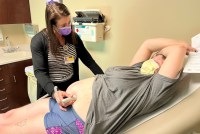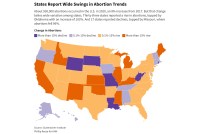Latest KFF Health News Stories
In Some States, Voters Will Get to Decide the Future of Abortion Rights
Measures to enshrine the right to abortion in the state constitution will be on the ballot in California and Vermont this fall. Abortion-rights advocates in Michigan are hoping their state will follow suit.
Nurse Midwives Step Up to Provide Prenatal Care After Two Rural Hospitals Shutter Birthing Centers
Dozens of Iowa hospitals have closed their birthing units. A team of University of Iowa nurse midwives can’t reopen them, but they’ve found a way to provide prenatal checkups and other crucial services in two towns.
A Free-for-All From Readers and Tweeters, From Medical Debt to Homelessness
KHN gives readers a chance to comment on a recent batch of stories.
KHN’s ‘What the Health?’: Life After ‘Roe’ Is … Confusing
A rapidly changing landscape for abortion has left patients, providers, employers, and lawmakers alike wondering what is and is not legal and what to do next. Meanwhile, Democrats in Congress have resumed negotiations on legislation to lower drug prices and, potentially, continue expanded insurance subsidies for the Affordable Care Act. Alice Miranda Ollstein of Politico, Tami Luhby of CNN, and Sandhya Raman of CQ Roll Call join KHN’s Julie Rovner to discuss these issues and more. Plus, for extra credit, the panelists recommend their favorite health policy stories of the week they think you should read, too.
Tres cosas que hay que saber sobre la cobertura del seguro para abortos
Apenas una de las decenas de conflictos: el aborto puede estar cubierto por un plan de salud, pero si no hay proveedores disponibles, las pacientes no tienen acceso.
Three Things to Know About Insurance Coverage for Abortion
Even before the Supreme Court struck down the constitutional right to abortion, insurance coverage for the service varied widely. Now it’s become even more complex, with additional changes and court challenges to come.
Self-Managed Abortions Gain Attention, but Helpers Risk Legal Trouble
A network of organizations help women use medication to end early pregnancies safely. But it’s a legal gray area in Tennessee and other states that restrict abortion.
The Push for Abortion Lawmaking After ‘Dobbs’ Is Unique, Legal and Political Experts Say
The surge of calls for special legislative sessions to pass abortion laws is an unusual occurrence in modern U.S. history, according to experts — one caused by the Supreme Court’s decision to give states more power to regulate abortion.
Montana Clinics That Provide Abortions Preemptively Restrict Pill Access for Out-of-State Patients
Montana is an island of legal abortion, but three of the state’s five clinics are limiting access to abortion pills for out-of-state patients in an effort to protect themselves and patients from legal attacks.
‘My Body, My Choice’: How Vaccine Foes Co-Opted the Abortion Rallying Cry
Anti-vaccine advocates discovered a catchy, succinct, and potent slogan. Its unlikely source: the abortion rights movement.
Big Employers Are Offering Abortion Benefits. Will the Information Stay Safe?
Work-based benefits may expand access to abortion for people who live in areas where the service is unavailable, but experts warn that claiming benefits could create a paper trail for law enforcement officials to follow.
KHN’s ‘What the Health?’: A World Without ‘Roe’
The Supreme Court’s decision overturning Roe v. Wade has created far more questions than it has answered about the continued legality and availability of abortion, as both abortion rights supporters and anti-abortion activists scramble to put their marks on policy. Meanwhile, Congress completes work on its gun bill and the FDA takes up the problem of the next covid-19 booster. Margot Sanger-Katz of The New York Times, Sarah Karlin-Smith of the Pink Sheet, and Victoria Knight of KHN join KHN’s Julie Rovner to discuss these issues and more. Also this week, Rovner interviews KHN’s Angela Hart, who reported and wrote the latest KHN-NPR “Bill of the Month” episode about two identical eye surgeries with very different price tags.
Watch: Crossing State Lines for Abortion Care
Illinois is one of the few states in the middle of the country where people can still legally access abortion care.
‘American Diagnosis’: Indigenous Advocates Work for Better Reproductive Care
From forced sterilizations in the 1960s to scant access to abortion care today, barriers to health care threaten Native people’s reproductive autonomy. Episode 7 explores efforts to protect and expand Native Americans’ access to comprehensive reproductive and sexual health care.
Three-Year Abortion Trends Vary Dramatically by State
About 930,000 abortions occurred in the U.S. in 2020, an 8% increase from 2017. But that nationwide figure belies dramatic variation among states — disparities expected to magnify in the wake of the Supreme Court’s decision to strike down Roe v. Wade.
Bajo las nuevas reglas para abortos, es más difícil lidiar con resultados de pruebas genéticas
Las embarazadas que reciben devastadoras noticias sobre condiciones genéticas deben lidiar con un estrés extra si deciden abortar y viven en estados que restrigen y hasta penalizan la práctica.
Genetic Screening Results Just Got Harder to Handle Under New Abortion Rules
Most prenatal genetic tests aren’t performed until after 11 weeks’ gestation, and the time between drawing a sample and getting results may be additional weeks. But new abortion restrictions prevent parents from choosing an abortion when they find out their child has a genetic disease, and make the already difficult decision for them.
Cinco cosas que hay que saber sobre el aborto ahora que la Corte Suprema anuló Roe vs. Wade
Con esta decisión, los estados tienen la capacidad de establecer sus propias restricciones, por lo que el lugar en el que viven las personas determinará su nivel de acceso al aborto.
KHN’s ‘What the Health?’: Supreme Court Overturns ‘Roe’
It was expected, but the reality was still jarring: The Supreme Court has formally overturned Roe v. Wade, erasing the nearly 50-year-old guarantee of abortion rights nationwide. Joanne Kenen of the Johns Hopkins Bloomberg School of Public Health, Sarah Varney of KHN, and Laurie Sobel, associate director for women’s health policy at KFF, join KHN’s Julie Rovner for this special episode to talk about the decision and what happens next for reproductive health care.
Como se esperaba, conservadores de la Corte Suprema terminan con el derecho al aborto
El presidente Joe Biden dijo que estaba en total desacuerdo con el fallo. “Es un día triste para la corte y para el país”, dijo. “La salud y la vida de las mujeres en esta nación ahora están en riesgo”.






















